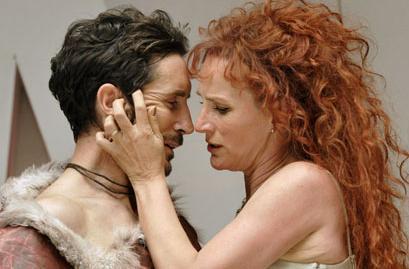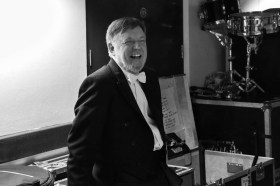Even though the Globe’s 2009 ‘Young Hearts’ season has been going from strength to strength all summer, I must confess to secret feelings of relief when I discovered that Frank McGuinness’ version of Euripides’ Helen runs at a trim 90 minutes without interval. Those wooden benches don’t get any softer on a humid summer evening.
Euripides / McGuiness’ conceit is that Helen of Troy was nothing of the kind, but a phantom copy of Menelaus’ faithful bride, stranded in Egypt for the duration of the Trojan wars. When Menelaus is marooned on the shores of the Nile on his way back to Greece, the couple are reunited and make their escape by outwitting doltish Egyptian Theoclymenes, who had been looking forward to getting his hands south of the face that launched a thousand ships. It is a comedy and funnier than I have made it sound.
Deborah Bruce’s production is livelier and more accessible than I had expected the Globe’s first foray into Greek drama to be. Penny Downie renders Helen a 21st century Everywoman who relishes her transformation from helpless victim to coquettish schemestress and Paul McGann gives Menelaus a convincing journey from despair to defiance.
The play begs the question: if Helen was never there, weren’t the Trojan Wars a bit pointless? It is not a giant leap from here to weapons of mass destruction but Bruce entirely avoids preaching to her audience. The message, if such a thing there be, is conveyed by adept use of the chorus: its members flit between the roles of Helen’s confidants, Greek refugees and Egyptian slaves. Much of the comedy flows from their interjections and reactions to events as they unfold. At one point in the midst of plotting her escape, Helen turns – almost as an afterthought – to one member, takes his hand and says, with all the well meaning sincerity of the powerful: “When we’ve saved ourselves, we might come back for you.” A blank look is the only reply she receives and, at the very end of the play, only the chorus members remain crouched on Gideon Davey’s lumpy set: it looks marginally less comfortable than the Globe benches.
Until 23 August.





